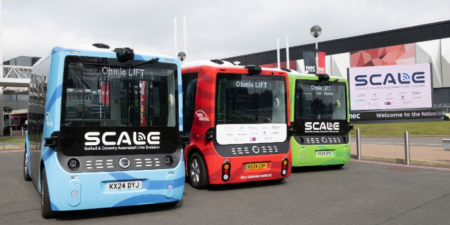California’s Governor, Jerry Brown, has signed a bill into law that allows a self-driving vehicle to test on a public road with no operator inside it; a key step towards enabling the Contra Costa Transportation Authority (CCTA) to test driverless shuttles at a private business park outside San Francisco.
Self-driving cars are already allowed to test on California public roads, but under current state regulations, a person must be in the driver’s seat and be capable of taking immediate manual control of the vehicle in the event of a technology failure or other emergency. Existing regulations also require the vehicle to have brake and accelerator pedals and a steering wheel.
The bill, introduced by Democratic Assemblymember Susan Bonilla, allows the CCTA to conduct a pilot project for the testing of autonomous vehicles that have no driver and are not equipped with a steering wheel or pedals, but only if the testing is conducted at specified locations and the driverless vehicle operates at speeds of less than 35mph (56km/h).
CCTA’s project to trial driverless EZ10 shuttles from French company EasyMile at the Bishop Ranch business park located in the city of San Ramon east of San Francisco in the Bay Area had been awaiting passage of the bill. The new legislation was needed because although driverless vehicles can be tested on private land such as the business park, the shuttle will have to cross a public road on its circuit through the campus.
Bill AB-1952 also covers the GoMentum Station in Concord, a 5,000-acre former military base where the CCTA and its partners, including Honda and Otto, are working on connected and autonomous vehicle technologies. Although the facility contains 20 miles (32km) of closed paved roads, the new legislation will now allow test vehicles to leave the site under certain conditions.
The bill requires organizations to provide the California Department of Motor Vehicles (DMV) proof of insurance cover of US$5m prior to the start of testing of any autonomous vehicle on or across a public road. The bill would require operators to provide the department with a detailed description of the testing program, and to disclose what personal information concerning a pilot project participant is collected by an autonomous vehicle.
Teams working on self-driving vehicles believe their first widespread real-world applications will be on campuses, business parks and other controlled environments with less traffic and fewer distractions than busy urban streets. Companies have complained that California state regulations on self-driving vehicles have previously been too restrictive, and that a variety of differing state regulations is unwieldy. However, the federal government has recently released a set of voluntary guidelines on autonomous vehicles, hoping to create a framework for states as they design rules governing driverless vehicles.




